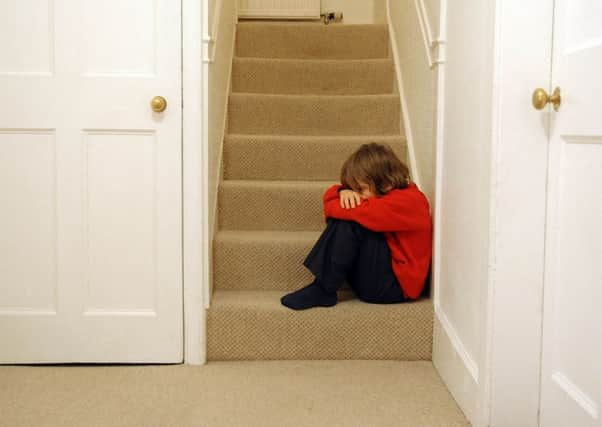Leaders: More resources could prevent child abuse


As we report today, Scottish local authorities have paid out more than £1.5 million to victims of child abuse during the last decade. Money alone cannot solve the problems – often life destroying – that victims face, but these payments do represent acknowledgement that vulnerable children were failed by a society that had a moral responsibility to protect them.
In the aftermath of such awful cases as that of Baby P, who died after suffering unimaginable torture at home, we quite understandably demand that such things should never happen again. We hold inquiries, and we demand sackings. We allow ourselves to believe that lessons have been learned and that, in future, children will be safe.
Advertisement
Hide AdAdvertisement
Hide AdBut the compensation payments to those who have been abused stand as testament to the complacency of believing the system cannot fail.
Every decade, it seems, finds its place in the public consciousness as the last time widespread abuse of children took place. But, time and again, we learn that the “bad old days” are more recent than we think.
Inevitably, when such cases emerge, social work departments become the focus for our anger. When children are thought to be at risk, social workers are expected to do all in their power to protect them. If there is to be an apportioning of blame, then social work departments will find themselves in line for the greatest degree of criticism.
But we have a tendency to oversimplify and, at times, unfairly attack council staff who can only do so much. Local authority budgets are under constant pressure and the necessity to make cuts shows little sign of easing. We should hardly be surprised that social workers, under-resourced and over-stretched, can allow some children to fall through the gaps.
The bleak truth is that no society can ever eradicate the abuse of children. Those who carry out such awful crimes do all they can to avoid detection; they are devious and resourceful and it is unreasonable to expect social workers to be able to detect every potential case of abuse.
What we can do as a society, however, is ensure that those we expect to protect children have the support they need.
It may be hugely appealing to think of yet another annual council tax freeze, but mightn’t we accept paying a little more if that meant that social work departments, dealing with complex and distressing cases, had enough staff to do what we demand of them? Wouldn’t it make sense for resources to be directed where they are most needed rather than cuts being made in order to support political promises about “hard working families” saving money?
The cases on which we report today will, sadly, mark the tip of an iceberg that can never melt away. The abuse of children by those – either parents or professionals – who are supposed to nurture and care for them is a bleak fact of life.
Advertisement
Hide AdAdvertisement
Hide AdSo let’s stop lazily reassuring ourselves that such cases are a thing of the past and, instead, look at the failures of today. The money paid to victims of abuse is no compensation for what they suffered. It is impossible to think that any sum might pay away the pain of a childhood lost and an adulthood lived in trauma.
But the very least those who were failed – and those even now being abused – deserve is for us to think again about how best we can make the system of protection as stringent as possible.
Muslim pride can conquer prejudice
For a very long time, we in Scotland have comforted ourselves with the belief that ours is a tolerant and welcoming society, relatively free of the tensions which can split communities elsewhere.
And, to a degree, we would say this is correct. In other parts of the United Kingdom, political parties such as the BNP – which makes explicit its belief that immigrants should be “sent home” – have enjoyed sporadic spells of support while failing, in Scotland, to be entertained by the electorate.
But we should not make the mistake of thinking our society is immune to problems that spiral out of people from different cultures living side by side. Islamophobia has been on the rise for some time. Muslims can feel that they are distrusted and that their traditions are under threat.
So we welcome a campaign to promote and celebrate the positive impact that Muslims have had on Scottish society. Like all prejudices, Islamophobia is rooted in fear and ignorance and anything which can show that Muslim Scots have the same hopes and fears – and the same stake in a successful, peaceful society – as others must be a good, positive thing.
And while we welcome this campaign, we are also hugely impressed by the words of two prominent Scots Muslims who speak thoughtfully about the risks of radicalisation of young people. Scottish Government minister Humza Yousaf and former Scottish Labour deputy leader Anas Sarwar ask difficult questions of their fellow Muslims. Quite correctly, they identify the need for those who follow Islam not to pin all the blame for the violent corruption of their faith on outside forces, but to look at what Muslims themselves can do to ensure greater harmony.
Ours is a multicultural society and that brings many benefits. It makes for a richer experience of life. But, in recent years, we have tended to focus on negatives, on the extremists who distort Islam for their own ideological ends.
Advertisement
Hide AdAdvertisement
Hide AdIn an ideal world, there would be no need for a campaign to make explicit the truth that Scots Muslims play a valuable role in our society but we do not live in an ideal world.
That being the case, let us hope this campaign is the great success it most assuredly deserves
to be.